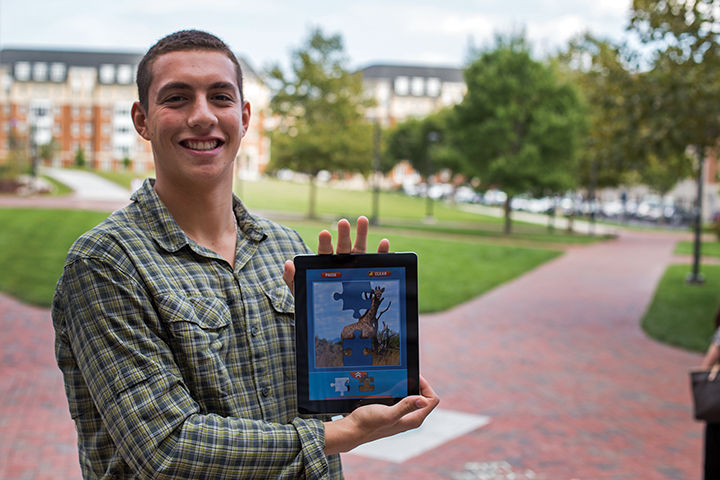
Junior Ghedalia Gold-Pastor showcases the app, Puzzable, he created with fellow student Zach Matz.
Zach Matz said that when Ghedalia Gold-Pastor visited his apartment and became his roommate in the same day, it was both fate and a leap of faith. Taking leaps of faith would prove a defining factor in their relationship and pursuit of entrepreneurial success.
Gold-Pastor, a junior mechanical engineering major, and Matz, a senior kinesiology major, joined forces in April 2013 to create Puzzable, an app that lets users take a picture, add a caption and send it to friends in the form of a jigsaw puzzle.
“I think [Puzzable is] a great concept,” said Adam VanWagner, the community and venture programs coordinator at this university’s Dingman Center for Entrepreneurship. “It combines two very popular segments of competitive gaming apps. … People are competing with each other, and then there’s the social aspect of everyone wanting to share their pictures with everybody.”
The app became available for Android and iOS on Aug. 23 and Sept. 2, respectively. Puzzable is free on all devices, and as of Monday, it had about 1,200 downloads, Gold-Pastor said.
Developing the app took about a year and a half and incurred a $40,000 investment, which Gold-Pastor and Matz raised through family contributions and their own life savings, Matz said. The bulk of the money went toward outsourcing part of the app’s development to a company in India, he said, while other funds financed campaigning and marketing tools.
“We put our hearts and souls into making it,” Matz said. “It’s a full-time job.”
The two also used on-campus resources to help make their product a success.
VanWagner said Gold-Pastor and Matz took full advantage of Fearless Founders, the Dingman Center’s three-stage program that uses lean startup methodology to help students build their businesses from the ground up. This method is a new approach for startups that favors consistent experimentation and consumer feedback to improve the product, rather than relying solely on company intuition and up-front development.
Gold-Pastor and Matz did most of their project development through this program, including creating their company, 417 App Studios LLC, interacting with customers, getting feedback, speaking with mentors and developing their “minimum viable product,” Puzzable, VanWagner said.
“The University of Maryland has been fantastic,” Gold-Pastor said. “They’ve been able to connect me with other people who have successful apps, and are a couple years ahead of me … so I’ve been able to get some nice mentorship.”
University programs like the Do Good Challenge — an eight-week competition that encourages students to create projects that will have a positive impact on others — also influenced the app’s growth, Matz said.
The Do Good Challenge spurred the idea of inviting nonprofit organizations to provide pictures for the app by sponsoring “puzzle packs,” Matz said. Sponsors would provide puzzle packs to Puzzable in exchange for either revenue shares when packs are sold, or advertising space, such as factoids along with pictures, to promote their causes.
“It was [the Do Good Challenge] that inspired us to reach beyond the gaming spectrum of Puzzable’s functionality and really apply it to help others and to help good causes,” Matz said.
Fearless Founders and the Do Good Challenge each gave Gold-Pastor and Matz $1,000 in award money. This money will go toward developing the app to make it more marketable, Gold-Pastor said.



